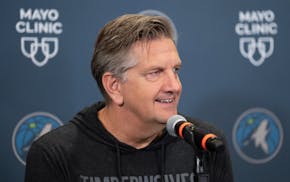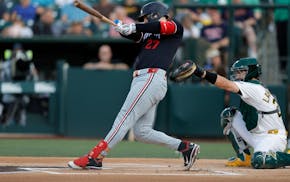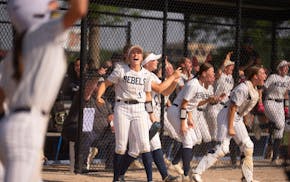Johnny Tauer felt uncertain about how his free-flowing offense would operate as St. Thomas embarked on the giant leap from Division III men's basketball to Division I in 2021.
He wondered whether it could still function the same against bigger, stronger, faster, more talented players on scholarship.
The Tommies proceeded to set a school record for fewest turnovers that season — threatening the NCAA's all-time mark — while averaging 75 points and ranking fifth nationally in three-pointers made per game (11.1).
"Whether it's D-III or D-I," forward Parker Bjorklund said, "we still play the same way: unselfish, smart, skilled."
Their style of play has allowed the Tommies to mitigate growing pains. They finished fourth in the Summit League in their second season at Division I and were picked No. 4 in the preseason poll this season, even though their roster won't reach the full allotment of scholarship players allowed in D-I until next season.
The term "sticky" has become popular in basketball vernacular to describe a lack of ball movement. Tauer's offense is the opposite of sticky.
His system is a purist's dream. Players pass and cut and look for open teammates. Spacing is paramount. All five guys on the court have the freedom to shoot. No red lights, all green. Limiting turnovers is what Tauer calls a "keystone metric." So is the percentage of made baskets off assists.
"Our guys are very aware that there's not going to be anybody who averages 20 points a game on this team," Tauer said. "But on any given night, there are eight or nine guys who could score 20."
Sharing the ball is a bedrock principle of his program. The Tommies once went eight consecutive seasons without a player averaging 15 points per game. They won or shared the MIAC title in all eight seasons and finished as D-III national champions twice. (NCAA rules require a five-year waiting period for a school that jumps to D-I before it can play in the NCAA tournament, so the Tommies aren't Madness-eligible until March 2026.)
If a recruit or player in the transfer portal is intent on being a primary scorer and focus of the offense, "we're probably not the right program," Tauer said.
"I always felt like the hardest teams to guard are the ones where you have to guard everybody and their bench," Tauer said. "It's also a fun way to play."
Creighton and Marquette — two nationally elite programs — will attest to the challenge of defending his offense. The Tommies pushed both teams to the wire before falling short to the No. 9 Bluejays 72-60 last season and 84-79 to the No. 7 Golden Eagles earlier this year.
"The beauty of basketball," Tauer said, "is if you can pass and you can catch and you can shoot and move, and you're all willing to do that and you don't care who scores, then within a 30-second possession, how do you find a solution that gives you an open shot?"
His philosophy took root as a young assistant in charge of the offense under Steve Fritz. Tauer incorporated concepts he gleaned from studying Bo Ryan at Wisconsin and Pete Carril's Princeton offense.
When he watched John Beilein's offense at Michigan, he thought: That's what I want us to play like.
He didn't know that Mike Maker was an assistant under Beilein at West Virginia before Michigan. Maker then became head coach at Division III Williams College, a team St. Thomas defeated in the national tournament one season.
"I told him after the game that's the hardest team we've ever had to defend," Tauer said.
In 2018, Maker, after losing his job at Marist, called Tauer to say that he was moving to the Twin Cities because his wife, Erica, was named women's cross-country coach at St. Olaf, her alma mater. The men shared a laugh when they learned that Tauer's wife Chancey graduated from St. Olaf the same year as Erica, and they were friends in school.
"What are the odds?" Tauer said.
Tauer added Maker to his staff and the offense has continued to evolve.
The coaching staff targets specifics skills in recruiting. Shooting, obviously, but they also put a high value on passing and court IQ.
"The system is very much equal opportunity," Tauer said.
The move to Division I required him to recruit better athletes and better talent, not change his offensive identity. Good offense is good offense, regardless of the setting.

Podcast: La Velle E. Neal III on Pablo Lopez's injury, Chris Finch's tenure

Home runs by Ryan Jeffers and Harrison Bader lift Twins past A's

Twins ace Pablo López prepares for monthslong absence
